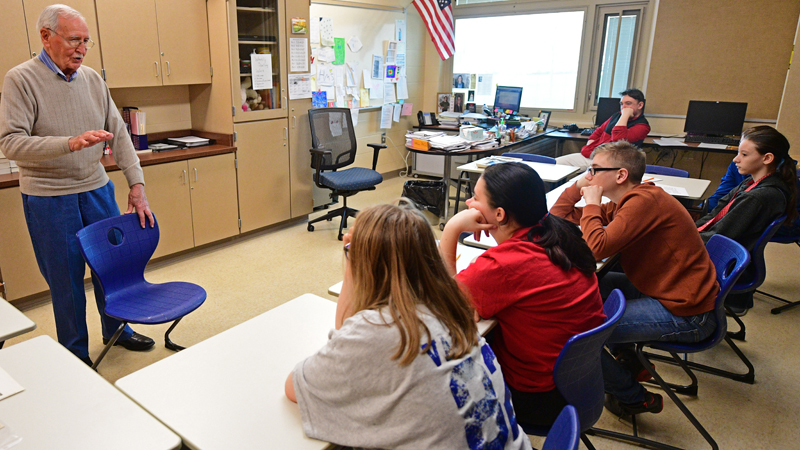WWII vet shares experiences with Hubbard students

By JUSTIN DENNIS
jdennis@vindy.com
HUBBARD
Stephen Kali was just a high-school sophomore when the U.S. joined World War II.
He enlisted in the Navy at 17 – not much older than the students in Hubbard Middle School teacher Becky Ague’s English classes. A little more than a year later, his Pittsburgh-forged transport ship ran ammunition during the Battle of Okinawa.
Kali is 92 now but said he still vividly remembers his two-year tour in the war’s Pacific theater. He shared those experiences Wednesday morning with Ague’s classes, to cap lessons on that war and a reading of Anne Frank’s “The Diary of a Young Girl.”
Kali, a naval yeoman and the youngest of seven, said he followed his older brother into the Navy, despite his immigrant father’s reluctance. But Kali was “just one of 16 million” who didn’t question that the American way of life was under threat after the Pearl Harbor attack, he said.
His 327-foot-long transport ship – one of more than 1,200 built at the Dravo Corp. shipyards in Pittsburgh – was designed to deliver tanks or supplies directly to a shoreline. They once stocked it with 50,000 cases of beer for the troops, he said, laughing.
It also brought 800 Japanese prisoners of war captured after an engagement on the tropical Peleliu
Island home for Christmas shortly after the war’s end. It was then Kali said he learned many of the men – who arrived in Tokyo Bay on Christmas Day 1945 wearing only white-and-khaki fatigues – were previously fighting in China and Burma before meeting U.S. forces and hadn’t been home in at least six years.
“It was difficult for us to even see that happening, and you could imagine how difficult it was for those men at that point,” he said.
After Kali was discharged from a Norfolk, Va., facility, he caught a train to New York City, where his sister lived in a Queens apartment. He said she was “shocked” to see him at her door, in full uniform.
Soon after, the phone rang – it was Kali’s brother who was discharged months
earlier.
“‘Have you heard from Steve?’” he said. “She says, ‘‘Yeah, he’s standing right here.’
“That was it. I took my uniform off,” Kali said.
Ague said she coordinated Kali’s visit “to give the kids a firsthand account” that tied into the lesson.
“The fact that he was able to share that and tie that into the kids was really powerful,” she said.
Though Kali is one of the area’s few surviving World War II veterans, he said his busy postwar career kept him from getting more involved in that community. But he still enjoys sharing stories from that time in his life, said daughter Cindy Kali, who’s probably heard them all by now.
“They make you think. And it’s just incredible – someone who went through all that, who was actually there,” she said.
In a way, Wednesday’s visit may have been therapeutic for her father, who up until recently spent all his time caring for his ailing wife before her death – a reason to get him out of the house, Cindy said.
“Even though it wasn’t a long period of time ... I relate to it and reflect back on it quite often as a major part of my life,” he said. “Maybe [the students] have a little bit better understanding of what does and can take place in our country and what our country stands for – the openness and democracy of our country, the willingness of men and women to do what’s necessary to maintain that.”
 43
43
